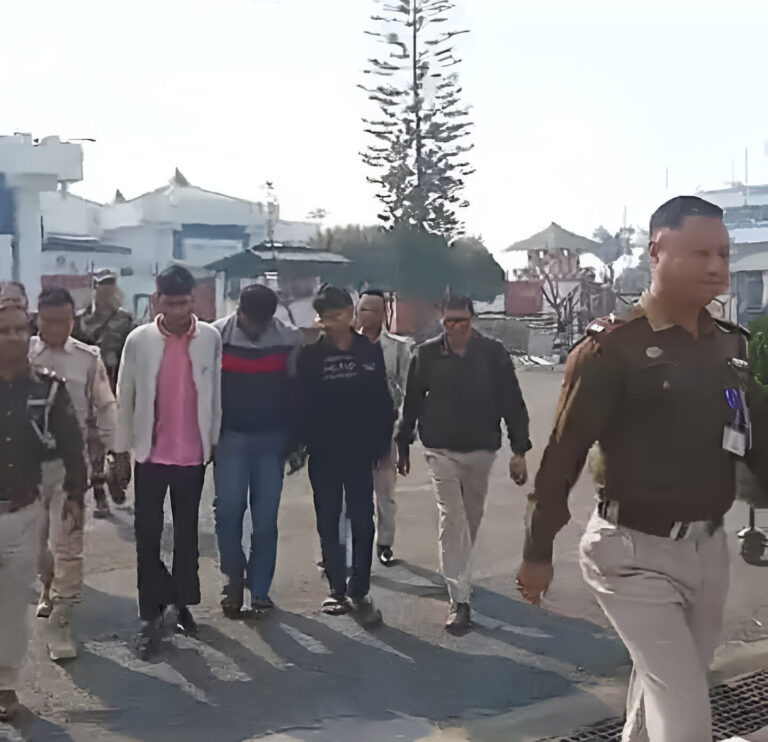Manipur Security Forces Intensify Search Operations to Ensure Safe Movement of Essential Supplies
Summary
In an effort to secure the safe and uninterrupted movement of essential supplies, security forces in Manipur have ramped up search operations across the state. With ethnic tensions and insurgent activity disrupting the state, these efforts are crucial to restoring order and normalcy in the region. The recent intensification of operations, particularly along the highways and supply routes, demonstrates the state’s determination to keep the flow of goods steady despite ongoing challenges.
The Importance of Essential Supply Lines in Manipur
Manipur, a northeastern Indian state bordered by Myanmar, has long faced challenges due to its geographical isolation. The rugged terrain, coupled with intermittent insurgent activities, makes the transportation of essential supplies like food, medicine, and fuel a complex task. The state’s reliance on a few key highways for the majority of its supplies has made these routes a point of strategic importance.
When unrest flares up, it’s not just the people who suffer, but also the flow of goods essential to everyday life. That’s why the recent move by security forces to intensify search operations across the region is a vital step. Ensuring that trucks carrying crucial supplies can move safely is not just about logistics—it’s about maintaining the fabric of daily life for the people of Manipur.
The Role of Security Forces: Protecting Lifelines
The involvement of security forces in this operation cannot be overstated. Their presence along highways, particularly along critical routes like National Highway 37 (NH-37) and National Highway 2 (NH-2), plays a pivotal role in ensuring that the transport of goods is protected from insurgent threats. In recent years, these highways have seen instances of blockades, attacks, and extortion by various groups.
The ongoing ethnic clashes in Manipur have further complicated the situation. The tensions between different communities in the state have led to disruptions in movement, sometimes resulting in shortages of supplies in key areas. Security forces are stepping up to ensure that these disruptions are minimized and that essential goods reach their destinations safely.
The Impact of Ethnic Tensions on Supply Chains
One of the primary causes of the current disruption is the ethnic unrest that has engulfed Manipur. The state has a complex social structure with multiple ethnic groups, including the Meiteis, Nagas, Kukis, and others. While Manipur has seen sporadic conflicts for decades, recent developments have led to a spike in violence, with different factions vying for control over key territories.
As a result, some of the critical supply routes have been affected by blockades and attacks, further complicating efforts to deliver essential goods to the population. The highways, which serve as lifelines for the state’s economy, have become vulnerable to sabotage.
It is in this volatile atmosphere that the security forces have ramped up their efforts. By conducting regular search operations and establishing checkpoints along the highways, the forces aim to create a secure corridor for the movement of goods, free from insurgent interference.
Key Areas Under Focus in the Operations
Manipur’s topography is dominated by hilly regions and dense forests, making it an ideal environment for insurgent groups to operate. These groups often take advantage of the difficult terrain to carry out ambushes and evade capture. To counter this, the search operations are focusing on key areas known for insurgent activity, such as:
- Imphal-Jiribam Route (NH-37): This highway is one of the primary routes connecting Manipur to other parts of India. Over the years, it has witnessed multiple blockades and disruptions due to both ethnic unrest and insurgent activity. The security forces have heightened their presence here, conducting vehicle checks, patrolling vulnerable areas, and ensuring a smooth flow of traffic.
- Imphal-Dimapur Route (NH-2): Another critical route, this highway connects Manipur with Nagaland and Assam. Given its strategic importance, it has been a frequent target for insurgent attacks and extortion rackets. Security forces are focusing their search operations on this stretch to prevent any potential disruptions.
Challenges Faced by Security Forces
While the security forces’ efforts are commendable, the task at hand is not without its challenges. The state’s complex socio-political landscape and geographical isolation make it difficult to ensure the complete security of supply routes. Some of the key challenges include:
- Insurgent Activity: Insurgent groups in Manipur, including factions of the Kangleipak Communist Party (KCP) and People’s Liberation Army (PLA), have a long history of disrupting transport routes. They often target highways with extortion demands, bombings, and ambushes, which make it difficult for supplies to move freely.
- Ethnic Clashes: The ongoing ethnic tensions in the state have led to frequent disruptions along supply routes, with different communities sometimes blockading highways to assert their demands. These blockades often lead to shortages of essential goods, further exacerbating the crisis.
- Geographical Barriers: Manipur’s hilly terrain and dense forests make it difficult for security forces to patrol every inch of the highways. Insurgent groups often use the terrain to their advantage, making it easier for them to evade capture.
- Public Sentiment: In some areas, insurgent groups still enjoy a degree of support from local populations. This complicates the efforts of security forces, as they must navigate not only the physical terrain but also the socio-political complexities of the region.
Government Initiatives to Ensure Smooth Supply Chains
In addition to the efforts by security forces, the government has also introduced several initiatives to ensure the smooth movement of goods in the state. These initiatives include:
- Increased Patrolling: The government has deployed additional forces along key highways to maintain law and order. This increased presence is intended to prevent insurgent attacks and ensure the safe passage of goods.
- Use of Technology: To combat the challenges posed by the terrain, the government has been exploring the use of drones and other surveillance technology to monitor supply routes. This allows for real-time monitoring of vulnerable areas and helps in responding quickly to any disruptions.
- Negotiations with Local Communities: The government is also working to address the root causes of ethnic tensions in the state by engaging in dialogue with local communities. By addressing the grievances of different groups, the government hopes to reduce the frequency of blockades and other disruptions along the highways.
A Step Toward Stability
The intensification of search operations by security forces is a positive step toward restoring stability in Manipur. While the challenges are immense, the continued presence of security personnel along the highways sends a clear message: the state will not allow insurgents or unrest to disrupt the flow of essential goods.
For the people of Manipur, the ability to access basic supplies like food, fuel, and medicine is not just a matter of convenience—it’s a matter of survival. The current situation highlights the importance of security and the need for continued vigilance in maintaining these lifelines.
What’s Next?
Looking ahead, it’s clear that the situation in Manipur will require a multi-faceted approach to resolve. The state needs not only military solutions but also socio-political reforms that address the underlying causes of the unrest. This includes addressing economic disparities, fostering dialogue between different ethnic groups, and ensuring that the benefits of development reach all corners of the state.
Only by addressing these issues comprehensively can Manipur hope to achieve lasting peace and stability. In the meantime, the efforts of security forces to ensure the safe movement of essential supplies are a crucial part of keeping the state functioning amidst the ongoing challenges.
FAQs
- Why are search operations being intensified in Manipur?
Security forces have intensified search operations to ensure the safe movement of essential supplies amidst ethnic tensions and insurgent activities in the state. - What are the key supply routes in Manipur?
The main supply routes include National Highway 37 (Imphal-Jiribam) and National Highway 2 (Imphal-Dimapur), which are crucial for transporting goods into the state. - What challenges do security forces face in maintaining these supply lines?
Challenges include insurgent activity, ethnic clashes, and the difficult geographical terrain of Manipur, which insurgents often use to their advantage. - How is the government addressing the situation?
The government is increasing patrols, using surveillance technology, and engaging in negotiations with local communities to address the root causes of the unrest. - What is the role of insurgent groups in disrupting supply chains?
Insurgent groups in Manipur, such as the KCP and PLA, often target supply routes with blockades, extortion, and ambushes to assert control and disrupt the state’s economy.




